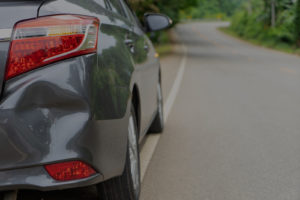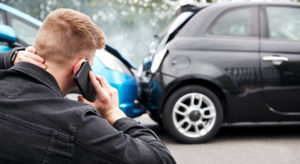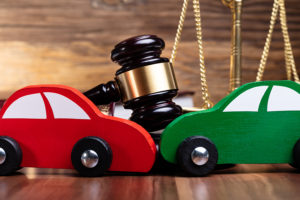New York offers something for everyone. The state has rural, scenic areas, as well as high rise cities with cultural experiences and everything in between. However, New York also suffers from traffic congestion, bad weather, and other issues that lead to car accidents. If you were injured in a car accident caused by someone else’s negligence, talk to an experienced New York car accident lawyer right away.
You may be able to pursue compensation for your accident-related losses by bringing an insurance claim or filing a New York car accident lawsuit. Let a skilled New York car accident attorney at Dolman Law Group Accident Injury Lawyers, PA explain your legal options during a free consultation and case evaluation.
A Dedicated New York Car Accident Lawyer Can Help You Recover Your Losses After a New York Car Accident

If you have been injured in a car accident in New York, your personal injury protection (PIP) policy will likely provide coverage for some of your medical expenses and lost wages. If your accident was the result of someone else’s careless or reckless actions, and your injuries meet the state’s serious injury threshold, then you likely qualify to file a New York car accident lawsuit. Injuries that meet this threshold include:
- Broken bones
- Substantial disfigurement
- Permanent impairment of use of a body organ or limb
- A substantial limitation of a body function or system
- Full disability for 90 days
A knowledgeable New York car accident lawyer can file an insurance claim or personal injury lawsuit in civil court on your behalf. Your attorney will need to prove who was responsible for the accident that caused your injuries to recover damages from the liable party for the expenses and losses you have incurred as a result of your injury. If you meet the serious injury threshold, to recover damages in a car accident lawsuit, your New York car accident attorney must prove that someone else was liable by establishing these elements:
- The at-fault party owed you a duty of care. The duty of care will depend on the type of accident and the at-fault party’s role in it. Generally, other drivers have a duty of care to operate their motor vehicles safely and legally.
- The at-fault party breached the duty of care. For example, if your accident resulted from a driver who was impaired by alcohol, the impairment would constitute a breach of the duty to drive safely and legally.
- The breach caused the accident that caused your injuries and led to your related expenses and losses.
Some of the damages your New York car crash lawyer can recover in a claim or lawsuit include:
- Medical expenses
- Lost wages
- Loss of future earning capacity if your injuries result in a permanent disability and render you unable to return to work
- The cost of repairing or replacing your car
- Physical pain and suffering as a result of your injuries
- Emotional distress
- Loss of the enjoyment of life
While most New York car accident cases are resolved through settlement negotiations, some cases do end up in litigation. An experienced auto accident lawyer provides important services in recovering damages through a settlement or court award.
Types of Car Collisions Our New York Car Accident Lawyers Handle Frequently
There are many different types of car accidents, all of which are capable of producing serious injuries and even death. Some of the most common types of car accidents that occur in New York include:
- Rear-end collisions: This is the most common type of two-car collision, with about 1.7 million rear-end accidents occurring in the U.S. each year. These accidents result in around half a million injuries annually. Rear-end crashes are most often the result of following too closely (tailgating), which involves the driver of the following car not having adequate space to come to a safe stop after the lead vehicle suddenly stops or slows. While the driver in the following car is most likely the liable party in a rear-end crash, there are circumstances in which the driver of the lead car is to blame. For example, if the lead car is moving in reverse when the collision happens or pulls in front of the rear car without first ensuring that the travel lane is available.
- Head-on collisions: While head-on collisions make up just a small percentage of the traffic accidents in the U.S., head-on collisions account for 56 percent of all passenger vehicle occupant fatalities. The severity of this type of crash is increased by the forward motion of both vehicles. Wrong-way driving is often the culprit in head-on crashes, whether it’s due to an impaired or a confused driver. This type of crash can also result in a chain reaction accident that involves a vehicle from one accident being pushed or rolling into oncoming traffic and causing another accident.
- Broadside accidents: Also known as a side-angle or T-bone accident, broadsides are an extremely dangerous type of accident in which the front of one vehicle collides with the side of another. These accidents generally result from one driver failing to yield the right-of-way to another and commonly occur in intersections. Because protective features, like airbags, are often absent on vehicle doors and the side frame is not as strong as in other parts of the car, vehicle occupants sitting on the side of the vehicle that was struck are at risk of severe injury or death in this type of accident.
- Sideswipe accidents: Sideswipe accidents occur when the side of one vehicle collides with the side of another vehicle. This type of accident generally involves a lane change, in which the driver changing lanes fails to ensure that there is a sufficient gap in traffic to move safely.
- Wrong-way crashes: Wrong-way crashes occur when a vehicle is driving the wrong direction down a one-way road or an entrance or exit ramp to the freeway due to alcohol or drug impairment, fatigue, or being lost. This type of accident generally results in a head-on collision.
- Chain reaction crashes: Chain reaction crashes occur when two vehicles collide, and the force of the accident causes one of the vehicles to strike another previously uninvolved car. Determining liability in this type of accident is often difficult, because it requires understanding the actions of multiple drivers and how they contributed to the accident.
- Rollover accidents: Often, the vehicle involved is tripped—meaning that the car struck something, such as another vehicle, a median, or a guardrail, that made it overturn. Rollovers can also involve vehicles with a high center of gravity overturning while attempting to navigate a sharp curve or a turn at too high of a speed.
- Single-car accidents: Just as the name suggests, a single-car accident only involves one motor vehicle, but this type of accident can still cause injury or even death to other people, such as pedestrians or bicyclists who might also be involved.
Common Causes of New York Car Collisions

Just as there are many different types of accidents, there are also many reasons why a car accident may occur. Some of the most common causes of car accidents involve:
- Speeding: More than 9,000 people die each year as a result of accidents caused by speeding. Speeding not only refers to driving faster than the posted speed limit, but also to driving too fast for the conditions of the road. The faster a person drives his or her car, the harder it is to maintain control over the vehicle. Speeding vehicles require more distance to stop while also reducing the amount of time that the driver has to see a hazard in the roadway and react to it by activating their brakes. Further, speeding reduces the effectiveness of the vehicle’s protective features, such as seat belts, airbags, and the steel frame, increasing the likelihood of serious injury or death.
- Distracted driving: Distracted driving is a major source of car accidents in the U.S. Some distractions, such as texting or other cell phone use, are addressed by states passing laws preventing people from engaging in these activities while driving. In New York, for example, individuals cannot drive while holding their cell phones or using them to text, talk, browse the internet, or play games. There are three primary types of driving distractions: (1) manual distractions – anything that causes the driver to take their hands off the wheel; (2) visual distractions – anything that causes the driver to take their eyes off the road; and (3) cognitive distractions – anything that draws the driver’s mind from the task of driving safely. Texting is particularly dangerous as it involves all three types of distractions. In fact, when traveling at highway speeds, in the time that a driver takes to read or reply to a text, they would have traveled the length of a football field without having both hands on the wheel, without looking at the road, and while focused on something other than driving. Other common driver distractions include eating, drinking, visiting with passengers, applying makeup, and looking at billboards, people, and previous accident scenes outside the window.
- Fatigued driving: Fatigued driving is driving while physically or mentally exhausted. While any driver can get behind the wheel after a sleepless night, fatigued driving is most often experienced by those who work night shift jobs and long-haul truckers. Sleeplessness is not the only cause of fatigue, either. Many individuals who report feeling fatigued when driving suffer from sleep apnea, or take certain medications that cause sleepiness.
- Alcohol or drug impairment: Around 30 people die each day in the U.S. as a result of drunk driving. Alcohol and drugs negatively impact the skills that a driver needs to drive safely, including tracking a moving target, braking or steering effectively, maintaining one’s own lane of travel, and exercising good judgment. Alcohol impairment does not begin when the individual reaches the legal limit for driving of .08 gram of alcohol per deciliter of blood. Instead, impairment begins with the first drink and worsens as drinking continues. Drug impairment can include illegal drugs as well as prescription or over-the-counter medication.
- Failure to yield the right-of-way: Vehicles are required to yield the right-of-way at certain times, most commonly at intersections. This means stopping at red lights, yielding when turning left on red or right on green (unless there is an arrow), and stopping for crosswalks, stop signs, and railroad tracks.
- Aggressive driving or road rage: Often used synonymously, aggressive driving and road rage are actually two different things. Aggressive driving involves risky driving behaviors, such as speeding or tailgating, that a driver may commit when attempting to get out of traffic congestion. Road rage may involve aggressive driving, but it is also an attempt to assault, intimidate, or punish another driver by honking, gesturing, yelling, attempting to bump or ram the vehicle from the roadway, or even getting out of the vehicle to confront another driver physically.
New York Car Accident FAQs

According to the New York State Department of Health, more than 1,000 people die in traffic-related crashes statewide and more than 12,000 are hospitalized each year due to car accidents. If you or a loved one was in a car accident in New York caused by someone else’s careless or reckless actions, you likely have a lot of questions about the legal process of recovering damages related to the expenses and impacts that you have incurred. Below are answers to some of the questions that our New York car accident attorneys most frequently answer about car crashes.
Can I recover damages from an uninsured driver in New York?
It can prove difficult to recover damages from an uninsured driver. While you can file a lawsuit and may even get a judgment in your favor, collecting on that judgment will be challenging because most uninsured drivers do not have the financial ability to pay for someone’s accident-related injuries out-of-pocket. Fortunately, you will likely qualify to recover some of your costs by filing a claim on your own insurance policy and/or by using your employment-related health insurance to cover some of your medical expenses.
If I refuse medical treatment at the scene and then later realize I am hurt, can I still file a New York car accident claim?
Yes, but in this situation, the at-fault party’s insurance company may dispute how and when you sustained your injuries. It is important to seek medical attention after a car accident, even if you don’t necessarily feel injured at the time. Many serious injuries have delayed symptoms, and the adrenaline rush someone experiences immediately after a car accident can also hide or dull the pain of injuries. Another reason to seek immediate medical treatment is to begin creating the paper trail evidence needed to successfully prove your legal claim in court.
The at-fault party’s insurance adjuster wants me to release my medical records. Should I?
You should never authorize a release of your medical records without first talking to an attorney. Only a few limited circumstances justify releasing such records. Accident victims who voluntarily release their medical records to the at-fault party’s insurance provider generally find that the adjuster wanted the records to uncover a reason to reduce or refuse payment on the claim.
I wasn’t at fault, and I don’t plan to file a claim with my own insurance company. Why do I have to report my accident to that company?
In the fine print of most auto insurance policies, there is a provision that requires you to report all accidents involving the insured vehicle. Even if you don’t plan to file a claim, you should still report the accident, because you signed a contractual agreement stating that you would. Failing to uphold your requirements for insurance may result in your insurance company dropping your policy.
My wife died due to injuries from a car accident. DoI have a New York wrongful death case?
You may qualify to recover damages through a wrongful death lawsuit rather than a New York car accident claim. When a person dies in a car accident, this type of claim can be filed by the decedent’s spouse, children, parents, or a personal representative of the estate. The damages that are recoverable through this type of action include:
- Lost earnings
- Loss of support
- Medical expenses
- Funeral and burial costs
- Pain and suffering
I wasn’t wearing a seat belt at the time of my crash. Can a New York car accident lawyer still help me recover damages?

An injured individual can still recover compensation even if they weren’t wearing a seatbelt at the time of the accident. However, your lack of a seat belt during your accident may reduce the amount you ultimately recover. New York law mandates that all individuals wear seat belts when traveling in motor vehicles. The law allows a seat belt defense, in which at-fault parties can argue that they should not bear responsibility for injury damages when a victim wasn’t buckled up. This may force claimants to prove that they would have suffered the same or similar injuries had they worn a seat belt or else face the loss of some or all of the damages available to them. An experienced car accident attorney at Dolman Law Group can help you understand how to seek compensation if you weren’t wearing a seatbelt at the time of your accident.
The police arrested the at-fault party at the scene following my crash. Does this mean that I don’t need a New York car accident attorney?
A skilled New York car crash lawyer can still file a claim on your behalf. The at-fault party’s arrest constitutes the beginning of their criminal case, which a government prosecutor will bring on behalf of the state. The financial penalties that a driver incurs in the criminal trial will go to the state rather than to any injured victims. A car accident lawsuit, on the other hand, is a civil proceeding. Injured individuals file their cases in civil court and don’t seek to convict or incarcerate anyone. Rather, your New York car accident lawyer must prove that someone else’s actions caused the accident that resulted in your injury and that the at-fault party is liable for the damages caused by your injury. A criminal proceeding and a civil action can stem from the same set of events without the outcome of one case impacting the other.
Why do most New York car accident cases resolve outside of court?
It is expensive to litigate a case. Most insurance carriers will opt to save on that expense by settling cases out of court. However, settlement offers rarely come without substantial negotiation because claimants need money to cover the actual expenses and impacts of their injuries, and insurance companies want to limit the amount of money that they must pay out for claims. Insurance companies will typically avoid making a fair offer until it becomes clear that, without one, a case is headed toward litigation.
How long does my New York car accident attorney have to file my personal injury claim?
New York car accident claimants generally have three years from the date of an accident to file a lawsuit and two years following the death of a family member to file a wrongful death lawsuit. Some exceptions to these time limits exist, and your attorney will advise you if there is a different deadline for filing in your case.
I drive for my job, and I was injured while working. Do I need a NY car accident lawyer to file a car crash claim or a workers’ compensation claim?
Workers’ compensation is a type of insurance policy that most employers in New York must legally provide to their employees. Workers’ compensation benefits provide coverage for medical expenses and lost wages resulting from work-related injuries. To determine which avenue you should pursue, it is important to consider the following:
- Was your work-related driving accident caused by the actions of someone else who does not work for your company? If so, then you should probably file a New York car accident lawsuit.
- Is your job as a driver an employed position, or are you an independent contractor? Businesses that use independent contractors for driving services are not required to pay into workers’ compensation. As such, in these circumstances, you should pursue a New York car accident case against the liable party for a lawsuit, provided your injuries meet the serious injury threshold.
- Were you at fault for the accident? If so, you may have to look to your own insurance coverage to cover your injury expenses.
What is the average settlement in a New York car accident case?
Settlement values are determined primarily based on a case’s specific circumstances. Because of this, there is no “average” settlement, but there are factors that can negatively or positively impact the value of your case. These factors include:
- The severity of your injuries and the amount of pain associated with your treatment. More severe injuries will impact the economic damage categories of medical expenses, lost wages, and even loss of future earning capacity, as well as the non-economic variety of damages, such as pain and suffering.
- Your age at the time of the accident. While no life is worth more than another, the value of a case involving a person midway through a career is likely to warrant more compensation than that of a case involving a retired person. The reason for this is that the middle-aged person will generally have a greater income and, therefore, suffer more substantial lost wages and loss of future earning capacity than someone who is no longer earning an income.
- Your overall health at the time of the accident. Pre-existing conditions are a common pain point in settlement negotiations, as insurance companies will often argue that the pain an injured person is experiencing is not a result of injuries caused by their insured, but rather by previous injuries.
- Your level of patience. Settlements often take substantial time to negotiate, particularly if the insurance company resists offering fair compensation early on in the process. Often, insurance companies wait until just before litigation begins or even after the trial has begun, but before the judgment is rendered, to make a fair settlement offer. Your attorney can help you explore the pros and cons of accepting any settlement offer, so you can determine the path that works best for you.
Will I have to pay taxes on my New York car accident settlement or award?
Because New York car accident settlements and awards are, for the most part, not considered income, they are generally not taxable. However, if you included medical expenses from your injuries as an itemized deduction on your taxes and then later received a settlement or award, you will have to repay the portion that you deducted. Additionally, in some cases, punitive damages punish defendants for particularly reckless behavior. If you received punitive damages in your case, that portion of your compensation is considered taxable income because it is not related to your injury.
What services can an experienced New York car accident lawyer at Dolman Law Group provide me?

Our experienced New York personal injury attorneys can provide services that may prove difficult to accomplish on your own. Qualified attorneys possess knowledge and experience about not only the legal process involved in recovering damages, but also the trauma that injured individuals must endure. In addition to the guidance that an attorney with such experience and knowledge can provide, they can also:
- Provide a free initial case review where you can ask your legal questions and determine if you want to retain the attorney to handle your case.
- Help determine all sources of liability and insurance resources that you may pursue for compensation.
- Establish the value of your case based on the actual expenses that you have incurred or will likely incur as a result of your injuries, as well as the impact that your injuries have had on your life.
- Ensure that your claim is filed in the proper jurisdiction within the statutory time limits.
- Negotiate with the at-fault party’s insurance carrier in an attempt to ensure that you receive a fair settlement offer.
- Represent you at all court-ordered pretrial conferences and hearings.
- Collect and organize evidence and witness testimony that may help prove your case.
- Work with experts, such as medical or accident reconstruction professionals, who can testify on your behalf.
- In lieu of a settlement, your attorney can litigate your case, including choosing a jury, delivering opening and closing statements, examining witnesses, and presenting evidence.
- Assist you in collecting your settlement or award.
- Provide these services on a contingent fee basis, meaning that you do not pay for your attorney’s services unless and until you receive compensation.
Contact a Dedicated New York Car Accident Lawyer at Dolman Law Group Today
If you were injured in a car accident, reach out to an experienced New York car accident lawyer from Dolman Law Group Accident Injury Lawyers, PA, for a free consultation. We can explain your legal options, answer all your questions, and help you find peace of mind knowing our compassionate and dedicated legal team is working for you.
Contact a New York car accident attorney at Dolman Law Group by calling 833-552-7274 (833-55-CRASH) or by contacting us online today.
New York Office Location
3250 Westchester Ave, suite 200A/B
Bronx, NY 10461
(718) 550-3471
Client Testimonial
“AMAZING and understanding attorneys! Did great on my case and I highly recommend Dolman Law Group Accident Injury Lawyers, PA for anyone that has been injured in an accident!” Rating: 5/5 ⭐⭐⭐⭐⭐ Koralis R. Jan 2020 Read more reviews on Google!
